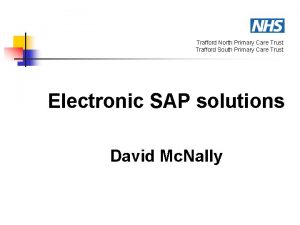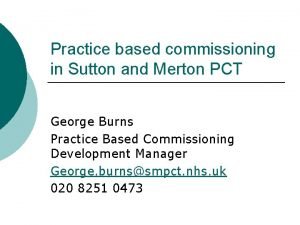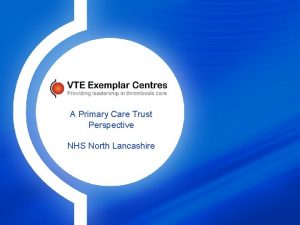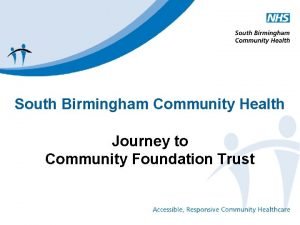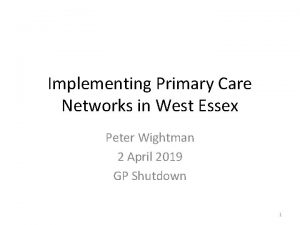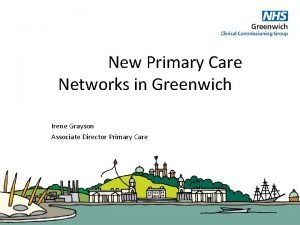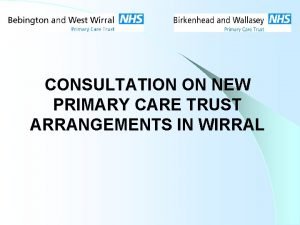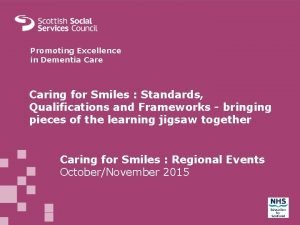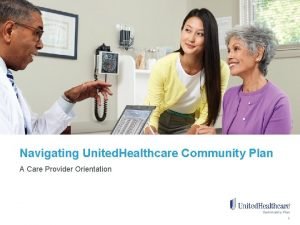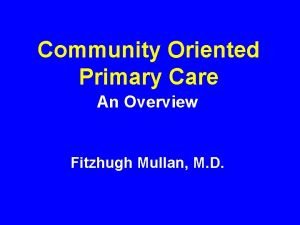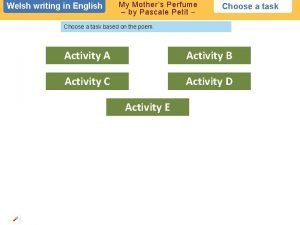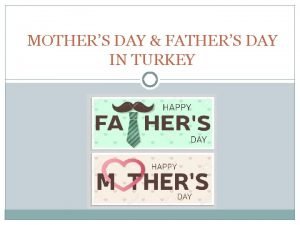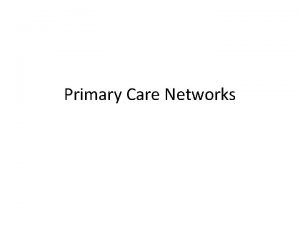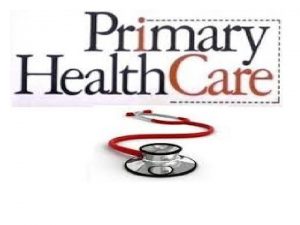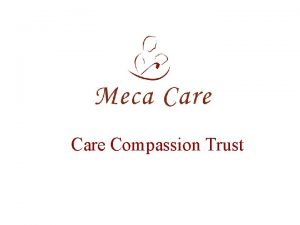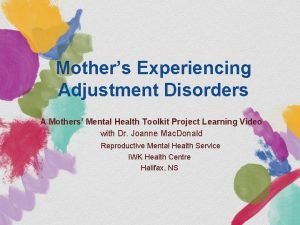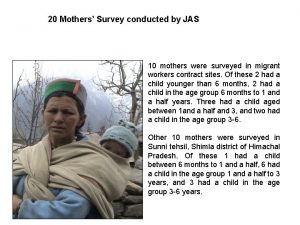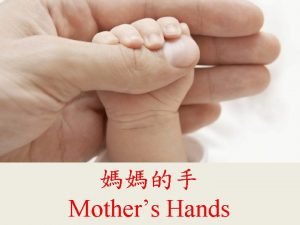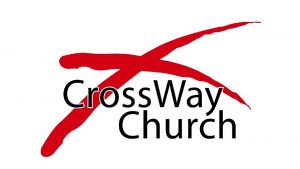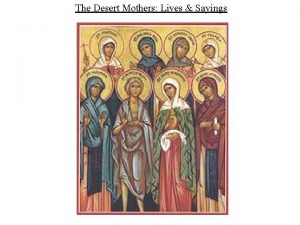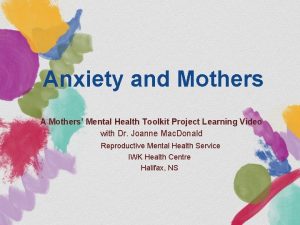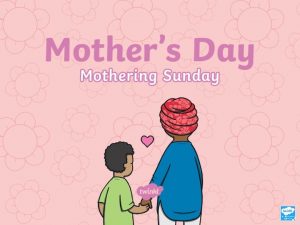Thurrock Primary Care Trust Thurrock Community Mothers Promoting





















- Slides: 21

Thurrock Primary Care Trust Thurrock Community Mothers Promoting Positive Health and Early Parenting Skills Growing Confidence Growing Communities

Mission Statement “We are growing team in the heart of the community enabling parents to help themselves by building confidence, skills and new opportunities” 2 Programme Strands Community Mothers recruited and trained Parents supported

Community Mothers Team Thurrock 2006 • • Operational base in Community Shop Public Health Practice Development Nurse 7 Programme Development Workers 6 Support Workers 20 volunteers Secretary Evaluation and finance officer

The Model: A Community Development Programme By the community and in the community Parents supporting parents Outreach Advocacy Community networking Facilitated but not ‘controlled’ by professionals Mutual learning Builds local skills Addressing health inequalities by transferring skills to the community itself

Partnership working alongside professionals Enables informal easy access to support Parents working with other parents as peers and equals Non-stigmatising Professionals cannot do it on their own! Complements professionals – doesn’t replace

Outreach & Primary Prevention • Developing early parenting skills • Promoting health: practical & real life context • Nipping early difficulties in the bud • Enabling self-help and building confidence • Easy access to health and other services • Developing literacy and numeracy skills • Identifying community views and needs • Community participation

Services Provided • Innovative semi-structured monthly home visiting programme to parents with young children • Breastfeeding support: community, home & hospital • Health focused literacy & numeracy home tuition for parents with complex needs • Active community outreach to homeless & travelling families • Parent support & learning groups in the community One third of parents supported are single parents

Programme Funding Thurrock Primary Care NHS Trust provides £ 315, 000 mainstream funding per annum

Needs Assessment Targeted outreach to engage with parents who: • • • Are isolated / depressed / low self-esteem May not seek help / vulnerable Are less able to cope Have poor past experience of being parented Are suspicious of professionals “It’s not just about what helpers do it’s also the characteristics of the helper and the relationship developed” Supporting Parents: Messages from Research Professor David Quinton published by the Dept of Health and Df. ES 2004 Jessica Kingsley

Needs Assessment • Outreach strategies targeted to geographical communities with highest levels of need (socioeducational / health inequalities / unemployment) • Introductory visits offered to all parents, following birth of first baby or moving into area • Professional referrals: parents facing difficulties e. g. child behaviour problems, depression • Parent empowered to identify own need for service • Learning needs assessment for literacy referrals

Personalised Needs Assessment Using the Home Visiting Programme Initial needs assessment 6 semi-structured monthly home visits Further needs assessment • Parent identifies aspirations / difficulties in context of own daily life • Community Mother and parent explore new ideas and solutions together • Parent empowered to set own practical and achievable ongoing monthly goals

Empowerment and Self-help Non-directive approach that enables parents to: • Avoid dependency on community mother • Identify and reflect on own life • Express own views, needs and concerns • Recognise own strengths and achievements • Value existing skills and build new ones • Self-select practical and achievable goals • Take small steps and build up to bigger steps • Learn from own mistakes and find own solutions • Build own social support networks

Sharing of cartoon illustrated information materials during visits is key to success • Speech • Cognitive • Child health • Nutrition • Child behaviour • Relationships • Breastfeeding • Community health • Early education • General parenting issues The process of sharing cartoons is crucial: • Non threatening • Not personalised • Triggers & openers for discussion • Awareness of literacy issues • Tips, suggestions, & reminders

Common issues that parents work on • Reducing isolation: support groups, social contacts, child-care and accessing services • Coping skills: reducing stress, improving couple relationship, money worries, personal issues • Child care skills: sleep, safety, behaviour • Healthy eating (whole family) • Taking more exercise: walking, swimming • General health: dental, immunisations, weight management, cervical screening, relaxing • Supporting child’s learning and development

Community Mother Credentials • Able to build trust and keep confidentiality • Good communicator, listening skills, sense of humour • Caring, likes people, shows empathy & understanding • Strengths and insights (overcome difficulties herself) • Reliable, responsible, committed to the community • Works as an equal: does not ‘look down’ on others • Willing to share experiences / work as part of a team Training & Support Package • Responds to both community led and statutory agendas • Emphasis on experiential learning / work experience • Provides flexible personal development opportunities

“Quality and training of staff is vital to programme success, as is good support and supervision” A Review of the International Evidence. Policy Research Bureau for Df. ES No 578 (2004) Professional support is vital: • Monitoring, supervision, facilitating • Taking professional action when needed • Clarifying & reinforcing programme boundaries • Delivering the accredited training programme • Developing partnership projects • Encouraging referrals from co-professionals • Evaluation and dissemination

Community Mothers Volunteer to Employment Training and Progression Pathway Signposting to other opportunities Initial Taster Course Community Mother volunteer recruited Introductory training Course for promoting community health and child development. Accredited at levels 1&2 Literacy & Numeracy Tutor Training & Progression Option NHS Employment Community Mother Health Literacy Tutors Introductory training course for breast-feeding support. Accredited at levels 2 & 3 Ongoing training programme (1 -2 years): (Generic modules) Experiential learning and work experience Accredited at levels 2 & 3 NHS Employment Community Mother Support Worker NHS Employment Programme Development Workers (Co-ordinating roles working towards Level 4)

Capacity Building: Sustainable Employment in the Community Benefits to Community Mothers Employment opportunities within the service: Employment opportunities outside the service: • Co-ordinators • Community Development • Trainers • Tutors • Support workers • Health and social care • Education sector

A Community Mother Journey: 10 Years Volunteer Breast Feeding Supporter Volunteer Community Mother Learning Support Worker Skilled for Health Project Co-ordinator “The programme has enabled my skills to develop to help me reach higher goals. Doors have opened and I am enjoying going through them. I feel a valuable member of society because I am sharing my skills with my community and watching parents grow and the community going from strength to strength”

Benefits to Parents and Children Improves: Reduces: • • • Isolation and depression • Child behaviour difficulties Child immunisations Breastfeeding rates Family nutrition Stimulation of children Maternal positive feelings Language development Child safety Health literacy Access to services

A Single Parent Journey “I have become more confident as an individual. My community mother has arranged visits from the women’s refuge and counselling from MIND has benefited me a lot. I have become more aware of healthy eating and what foods are right for children. I have enrolled on a hairdressing course and I am looking forward to going on this course and maybe making some new friends. I took my son to the doctors and he has referred us for family counselling. This is a very positive step towards helping my son. I have made contact with the single parent support group and have tried to make new friends. I feel my life is on the right path at the moment and I feel really happy. ”
 Primary secondary and tertiary care
Primary secondary and tertiary care Trafford primary care trust
Trafford primary care trust Sutton & merton primary care trust
Sutton & merton primary care trust Primare lincolnshire
Primare lincolnshire South birmingham primary care trust
South birmingham primary care trust West essex primary care trust
West essex primary care trust Irene biemmi
Irene biemmi Maghull pct
Maghull pct Promoting excellence in dementia care
Promoting excellence in dementia care Uhccp com tnenroll
Uhccp com tnenroll Community oriented primary care definition
Community oriented primary care definition Northern trust charitable trust
Northern trust charitable trust My mothers perfume
My mothers perfume Thanking god for mothers
Thanking god for mothers Proverbs 31:28-29 esv
Proverbs 31:28-29 esv Mothers day finland
Mothers day finland Mother's day turkey
Mother's day turkey Happy mothers day in chinese
Happy mothers day in chinese God's plan for mothers
God's plan for mothers Romeo and juliet board game
Romeo and juliet board game Sad mothers day poem
Sad mothers day poem Tracing family descent through mothers rather than fathers
Tracing family descent through mothers rather than fathers

